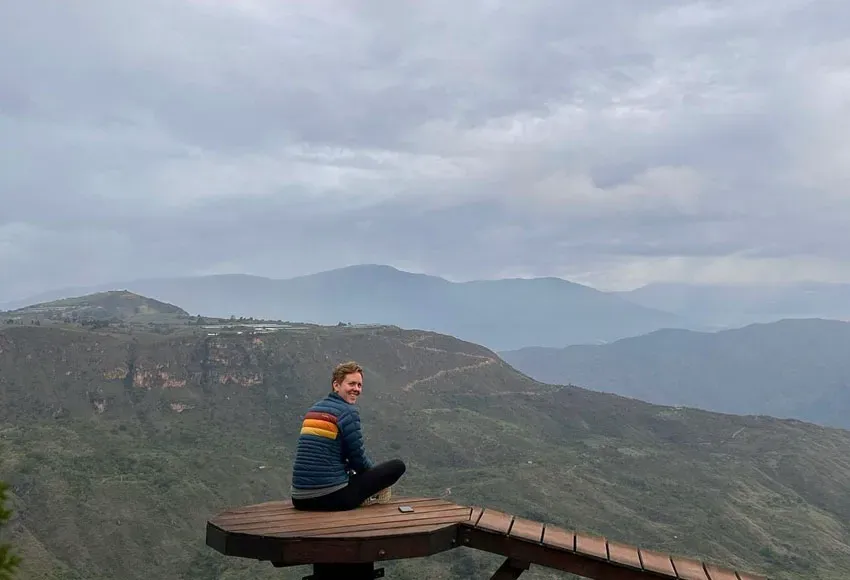For the past year, former Spokane city councilmember Kate Burke has been on the biggest adventure of her life: traveling the world. "This is something that I've always wanted to do," Burke said. "Just go and travel and see the world, see what's out there, and I just never put it as a priority for myself."
Tethered to a small town
Despite her dream of seeing the world, Burke had a lot tethering her to Spokane, Washington. She was the youngest member of the city council, providing a liberal perspective to the conservative Eastern Washington city. "I was giving it my all. I didn't matter over anybody else, and I was going to do everything I could to change as much as I could," she recalled of her time on the council.
Burke fought for the rights of unhoused, BIPOC, and LGBTQ+ people in Spokane. She spent so much energy fighting for others she had nothing left to give to herself. "I got sick. It was not good. It was not healthy. I went to this place where I never wanted to work again. I was so burnt out. I was so sick and tired, and I didn't want to do anything ever again," she said. After four years of serving the community, Burke decided to step away in 2021.
"I finally came to a spot in my life where I wasn't happy with what I was doing work-wise and the direction I was going. I also found a partner who was just as crazy as me and wanted to do something similar," Burke recalled. After leaving her job and discussing her plans with Sarah, Burke decided to take the leap.
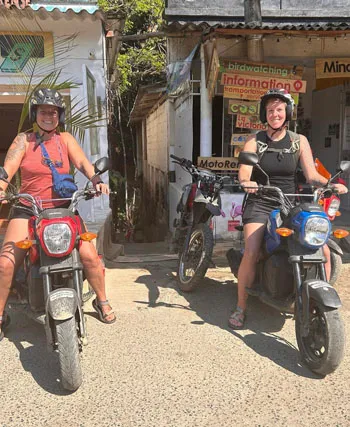
The adventure begins!
Burke and Sarah sold all their belongings, bought a car, and first drove across the United States. They then sold their car and traveled to Mexico. "We knew we were going to Mexico first. We had a friend who let us stay in their house in Merida for two weeks, so we were like, 'Great, this is a good starting point. We'll start there.' So we went there and didn't have plans after that," Burke said.
The couple spent four months in the country, visiting Merida, Valladolid, Troncones, Mexico City, Oaxaca City, and Mazunte. "We chose Mexico first because we knew we could be there for 180 days, so we weren't stressed to go fast or see all these places," Burke said. "We had a great time. We barely touched seeing Mexico. We only saw five or six places. We still have so much more adventuring to do there. We liked the beaches."
When they left Mexico, their adventure had barely begun. Now more seasoned as travelers, they had learned many lessons from Mexico they applied to their second destination, Colombia. "Once we got to Colombia, we knew that we didn't want to stay more than two weeks at most places because that's a long time to stay in one spot unless you have thousands of things to do or have friends there, so we were able to do less planning, more moving," Burke said.
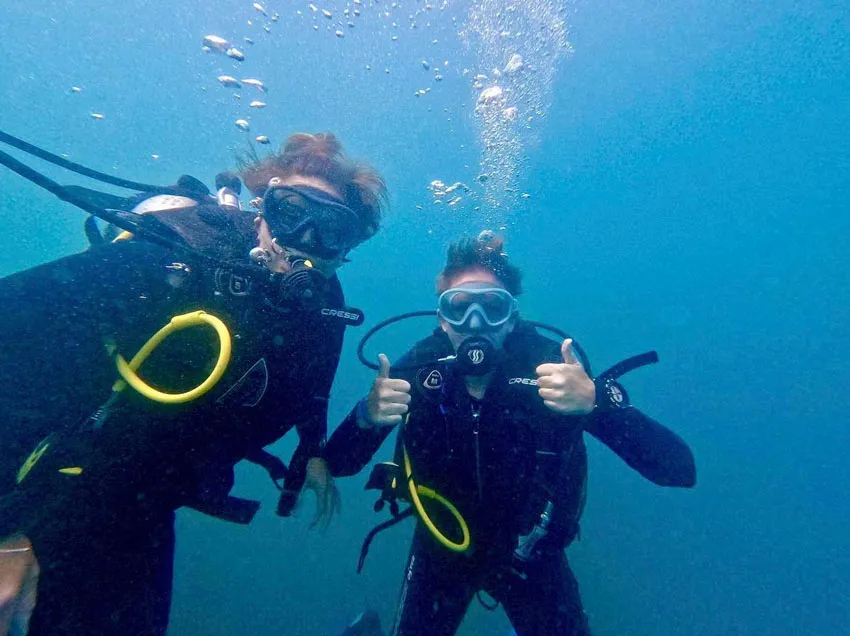
The couple fell in love with Colombia. "There's a lot to do outdoors – hiking, ropes courses, paragliding, all that stuff. It was so much fun there," Burke said. They stayed in the country for a month, exploring waterfalls, surfing, snorkeling, and biking. Despite being in Colombia for only a month, they got around, visiting Bogota, Santa Marta, Minca, Palomino, Mesa de los Santos, San Gil, Barichara, Medellin, and Guatapé.
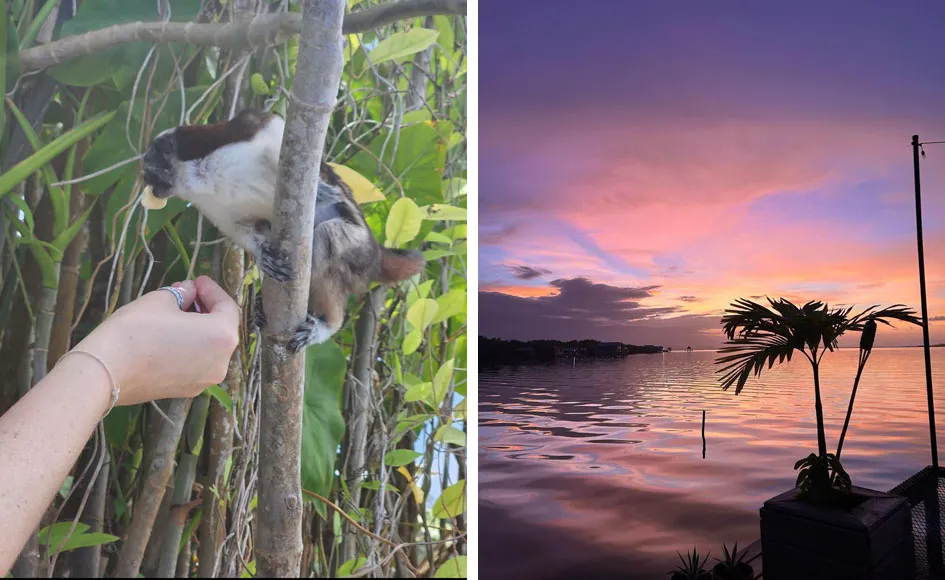
Next they traveled to Panama, where they learned more about what they do and don't like. "We went to Mexico, and we were like, 'This is cool, we like this,' and we went to Colombia, and we were like, 'This is awesome,' and then we went to Panama and were like, 'Okay, so there are places we don't connect with,'" Burke said. "For a while, we thought maybe we would just like every place we go because it's not the United States, but that's not the case. Being able to see and experience different places because every place has a vibe, all the people are different."
They spent a month in Panama, visiting Panama City and Bocas del Toro. One of their favorite things about Panama was the wildlife – they saw dolphins, sloths, and starfish.
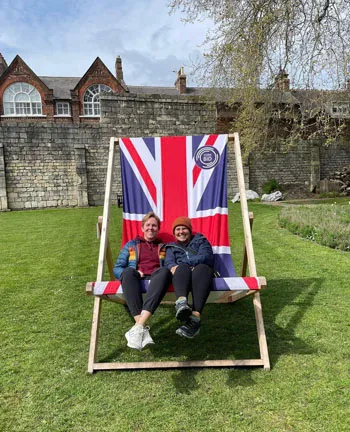
Next they hopped across the pond to explore England, Scotland, and Ireland. While they enjoyed the lush countryside, diversity, and vegan food options, they also found the people were not quite as friendly as they had been in Latin America, and driving on the left side of the road was difficult.
After the UK, they went to Spain, where they visited beautiful nature parks, and historic architecture, and enjoyed a vegan tapas tour.
Planning vs. spontaneity
They found that planning is a must for anyone visiting Europe. "We have to plan here. We bought a Eurail pass for the trains. You have to buy those tickets ahead of time and reserve seats, and we planned our trip ahead of time through Spain."
While planning can be helpful, Burke says keeping options open has also helped them find hidden gems they may not have otherwise experienced. "One thing about not planning is that you can start talking to locals, and they'll be like, 'Oh, you have to go here,'" she said. "We would never have found Mazunte. One of our friends in the United States told us to go, but then multiple Mexican people told us, 'You have to go.' We were like, okay, we have to go there. If you plan too far ahead, you might miss out on small gems you wouldn't even hear about. It's finding a balance between planning and letting travel happen."
Burke has learned more about the world, herself, and her partner on their adventures. "This is a good way to figure out if the person you're with is the person you're supposed to be with," Burke admitted. "There's 20-hour travel days, sleepless nights, noisy neighbors, walking seven or ten miles a day sometimes. Trying to figure out how to travel together, it's a lot of compromises, listening, learning, and it's a cool thing."
Safety
One thing they found about traveling the world is that it's much safer than American media often portrays. "The United States likes to fearmonger other countries as unsafe," Burke said. "Of course, I never fully bought into that. I had my knowledge, and I would research things. The first question [Americans] say when we go to Mexico and Colombia is, 'Oh my God, did you feel safe?' I felt 150% safer than anywhere I've ever been in the United States. It's a different experience," she continued.
The place where the couple felt the least safe was the United States. "We traveled through the United States before we left, and there were places where I was going to tell people that Sarah was my relative or friend if they asked. In other countries, I've felt zero obligation to lie or say anything like that," Burke said.
Seeing the world has helped Burke learn more about her country of origin. "People in the United States take things too seriously and overcomplicate everything," she said. "Other countries, the ones we've visited, seem to have different priorities about what's important. They also seem to be less inclined to get intimately connected with how your life is going. For instance, it seems people in Mexico, Colombia, and Panama couldn't care less about if people get abortions or if they're Gay or Trans or what have you because it doesn't affect their daily life."
Burke has also learned that Americans are less educated on global issues than most of the locals she and Sarah met. "You don't understand how conceited we are until you leave and see that no one cares. No one cares like we care about ourselves. We put ourselves at the forefront of everything," she said. "I'll put on the TV, and there will be news on, and it will just be global news. It doesn't seem like that in the United States. It's so much about us and what we do. We're not taught about other cultures in school."
Basic high school language requirements don't even scratch the surface of what other countries do to educate their children to become global citizens. "It's not a priority to educate us on the rest of the world. Every person we've met has known so much about the politics in the United States and how our systems work and these things that most people don't know about other countries from the United States. That's a huge thing. It's been eye-opening," she said.
Burke says they've felt welcome as a Queer couple in every place they've traveled, thanks to prior planning and research before they pick their location. "The big precautions you need to take are looking up what's legal and what's not. We don't even want to visit any countries that don't have good policies around LGBTQ because we don't want to give those places our time and energy, especially if we can't be ourselves."
They also make sure the resources they use are accurate. "We try to find authentic articles, not fear mongering United States articles or anything like that, but we try to dig deep and find things," Burke said. "People will be like, 'You should visit here,' . . . but they're not Queer. You have to be very careful of what you listen to. Some people would say, 'It's totally fine,' but they're straight and don't understand how scary it can be or the types of interactions you can have." Burke and her partner also make sure the locations they travel to are welcoming of BIPOC people.
The couple is careful about where and when they go out as well. "Something that's probably different from other people traveling – we do not party. We don't go out late. We don't drink. We're not searching for drugs or anything like that," Burke said.
Returning to the US
Currently, the couple is in Portugal. They're headed to Amsterdam next before flying back to the US. Despite the fact that US politics leaves her drained and disappointed, Burke says she is excited to come back home and see her friends and family again. "Traveling has been amazing but also very isolating, especially when we've gone to a majority of countries that don't speak English, so we haven't had strong connections with the locals," she said. "We've met some other travelers, which has been nice, but overall it's been isolating. I'm excited to see friends and family again."
While she is happy to come home, she's also wary of falling back into the American systems that left her so drained in the first place. "There's a lot of things that I don't like about the States. I don't want to get sucked back into what I thought was important," she admitted.
Since seeing the world and meeting so many new people, Burke has realized that the emphasis Americans put on work can quickly become toxic. "Now I'm in this place where I can see myself having a job, and when it's over, it's done. I'm still enjoying life," she said. "If you buy into the American dream, you're wasting your life. There's no such thing as the American dream, it's just capitalism. They're trying to use our bodies and minds as their little cogs in the machine. It's not worth it, and I will never do that again."
They plan on returning to the US for a little while to save money, visit family, and get married. Then they hope to travel more. "People have reached out and said, 'I wish I would have done what you're doing.' Older people always say, 'You're doing it right. I wish I would have done that,' and young people will say, 'I wish I could do that.' It's not easy, but people can do it," she said. "I say if someone's thinking about it, I would go for it. I am so happy with the people I've met and the experiences I've had. Just seeing other countries, it's amazing."
For anyone, especially Queer and Trans people, looking to leave the United States soon, Burke suggests traveling to multiple locations and "trying countries on" before settling on a permanent home. "If you can, travel before you pick a spot because I would have never known anything about Colombia except for what the United States says about it in horrible articles about it being unsafe. Going there was such an amazing experience, the Colombian people are so amazing. I'm in love with it."
Since leaving the US, Burke has felt happier, healthier, and safer. There's a wide world out there, and she plans on seeing as much of it as she can. You can follow her adventures on Instagram at @wild_world_women.


